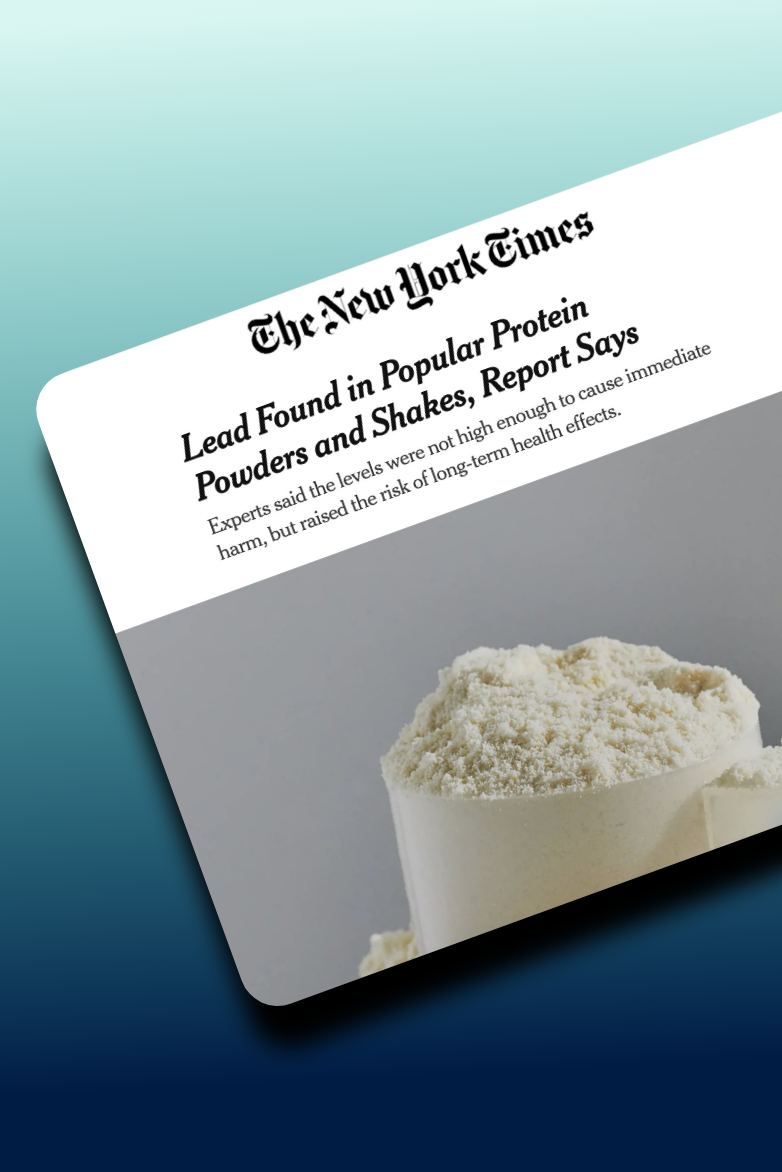
Do You Want More or Less Lead?
Consumer Reports recently uncovered high levels of lead in protein powders, here’s why it matters and what Puori does differently.
The Protein Powder Paradox
A new investigation by Consumer Reports has highlighted a growing concern in the wellness industry: worrying levels of lead and other heavy metals in popular protein powders and shakes. In fact, nearly 70% of the products tested contained more lead per serving than the 0.5 micrograms their experts say is safe to consume in a day - some by more than tenfold.
As the market for protein supplements grows, so do the risks of hidden contaminants as was also proven in the Protein Study 2.0 by The Clean Label Project earlier this year. And it’s not just plant-based products, even dairy and beef-based options proved problematic.
Why Does This Matter?
Lead is a heavy metal with no beneficial role in human nutrition. Chronic exposure even at levels well below what causes immediate toxicity can contribute to adverse health outcomes, especially in children, pregnant women, and those with compromised health*. The truth is, trace amounts of lead are almost inevitable in crops, but just knowing this shouldn’t excuse high levels in the products we use daily to support our health.
The Industry’s Response:
Shifting the Goalposts
Many of the brands that were called out in the report point to the fact that lead contamination is “naturally occurring” and impossible to avoid. Some even argue that the California Proposition 65 safety levels (currently one of the most protective in the world) are “too low” - implying consumers would be safe with more lead exposure than Prop65 limits advise.
Let’s be clear: Debating where the line should be drawn when it comes to toxic metals is beside the point. Ultimately, the real question is simple: Do you want more or less lead in your protein powder?
Our Position at Puori
-
Less is always better. Puori’s PW1 protein uses premium-quality ingredients, rigorous sourcing, and third-party testing to help keep heavy metal contamination - including lead - as close to zero as practically possible.
-
Transparency above all. You deserve to decide for yourself what you’re comfortable consuming. That’s why Puori provides full access to batch-by-batch 3rd party test results across 200+ contaminants, so you know exactly what you’re getting, with nothing hidden and nothing swept under the rug.
- Tested, Trusted, Clean. Our dairy-based protein consistently demonstrates some of the lowest levels of lead and other heavy metals in the category, below even the most stringent safety thresholds.
The Takeaway
No supplement is risk-free, and lead in food crops isn’t fully avoidable. But every milligram, every microgram, every decision matters. At Puori, we believe the goal must always be to reduce your exposure as much as possible, both for your health and your peace of mind.
Ask yourself:
- Are you comfortable giving your family a protein powder where you don’t know the level of lead contamination, simply because it is within the legal limit, even if it might be multiple times above Prop65 safety levels?
- Or do you want a product that aims for as little as possible, and let’s you see the test results for every batch of every product?
If you want less, choose PW1 Whey Protein and hold us to the highest standard. We’re committed to going beyond compliance and letting transparency guide every batch we make.
As a testament to this commitment, even if you opt for 2 servings per day, our PW1 Bourbon Vanilla will not bring you over the Prop 65 limits, but due to cacao beans often containing higher levels of lead, we do not sell the Strong subscription aimed at 2 daily servings for the chocolate flavor, as some batches might bring you above the limits if you double the dose. Tip: if you simply love our chocolate flavor but want two servings per day, we suggest mixing the chocolate flavored with the vanilla flavored.
Puori is Purity, Potency & Peace of Mind
https://www.who.int/news-room/fact-sheets/detail/lead-poisoning-and-health https://ntp.niehs.nih.gov/research/assessments/noncancer/completed/lead https://www.cdc.gov/lead-prevention/about/index.html